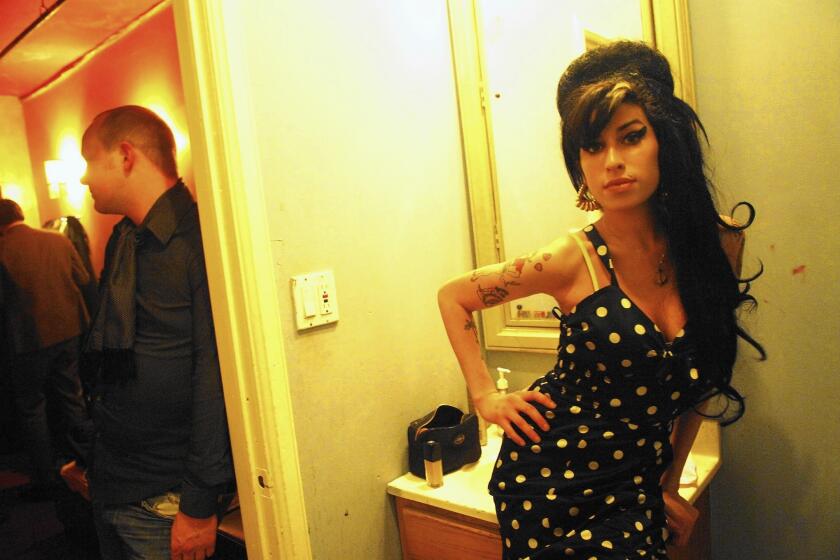Review: There’s no curiosity about Amy Winehouse at all in the reductive, shallow portrait ‘Back to Black’

It would be a challenging undertaking for any filmmaker or actor to represent in biopic form the outsize talent, unique style and utterly devastating downfall of soul singer Amy Winehouse. To quote one of Winehouse’s most poignant ballads, the endeavor is “a losing game” before it even starts.
Hers is such a tragic story that Asif Kapadia limited his Oscar-winning 2015 documentary “Amy” to audio recordings set to archival footage to examine Winehouse’s life, never showing the faces of the interview subjects. It’s as if it was too painful to confront head-on: her timeless gift, her destructive love story, her unapologetic persona — glittering and gutter-drunk. Any facsimile could never come close to the real thing, in all of its beauty and horror.
To play the British soul singer, a relative unknown was cast, Marisa Abela, who committed herself to capturing the full complexity of a talented, tragic life.
Director Sam Taylor-Johnson and writer Matt Greenhalgh, who previously collaborated on the 2009 John Lennon biopic “Nowhere Boy,” have nevertheless persisted with the Winehouse biopic “Back to Black.” “Industry” star Marisa Abela dons the signature black beehive hairdo and winged eyeliner to channel the doomed singer, who released the iconic album of new standards “Back to Black” in 2006 and became a tabloid fixture in the mid-aughts. Paparazzi scrupulously documented her physical and mental deterioration from drug and alcohol abuse before she died from alcohol poisoning in 2011, joining the notorious “27 Club” of musicians who have all died at age 27.
Abela, who does her own singing and miraculously captures the vintage jazz style and timbre of Winehouse’s undeniable vocal talent, delivers a fully committed performance. But the film itself is a shallow portrait that recounts gossipy facts and lore about Winehouse and her troubled relationship with husband Blake Fielder-Civil (an admittedly fantastic Jack O’Connell).
Greenhalgh’s script doesn’t seem at all interested in understanding Winehouse psychologically, instead ascribing all her woes to her toxic co-dependent relationship with Fielder-Civil. Many of the other men in her life, including her father, Mitch (Eddie Marsan), get off fairly easy.

The script is content to blame Amy for her own self-destructive spiral without examining the industrial context that contributed to it — the pressure to tour and perform even when she was struggling, the lack of protection and support, the vicious media commentary about her body and appearance. Packs of paparazzi are a presence in the film, but “Back to Black” doesn’t dive into who is driving the desire for these seedy photos: both media titans and their audiences, hungry for sensation.
There’s no curiosity about Amy at all in “Back to Black,” just a condescending presentation of a girl with a great voice and a bad boyfriend. The script even goes so far as to suggest that, in addition to the loss of her grandmother Cynthia (Lesley Manville), the core of Amy’s heartbreak is her unfulfilled desire to have children. She stares longingly at toddlers and has inappropriate conversations with kids, telling a young fan, “I wish I was your mum.” It’s insultingly reductive.
Though “Back to Black” is a somewhat unnecessary reminder of the incredible album that came out of Winehouse’s tumultuous relationship with Fielder-Civil, and Abela delivers sound-alike (if over-pronounced) vocal performances of the tunes, Taylor-Johnson fumbles how these songs are utilized. She lets the first verse play, then has the rest of the song soundtrack a montage that speeds through the story and conveniently conflates certain events. Winehouse’s scorcher of a scorned woman song, the album and film’s titular number, “Back to Black,” is completely misused over a montage, bizarrely linking the tune to her grandmother’s death and draining it of its emotional power.
Before she won six Grammys (including a trio for her massive breakout hit “Rehab”), before she descended into a morass of addiction and public humiliation, before she died of alcohol poisoning at age 27, bravura British songwriter and vocalist Amy Winehouse was simply a young woman with an extraordinary gift for song.
This is not the first time that Taylor-Johnson has cinematically flattened a hyper-controversial story that was originally caked in gore and forced media consumers to question our own relationship to a kind of dark voyeurism. She adapted the James Frey rehab “memoir” “A Million Little Pieces” to similarly sanitized ends in 2019, sanding off the rough edges and failing to ask any of the hard questions. Why tackle these complex stories if you’re just going to reduce them to easily digestible pablum?
With a visual style that is straightforward and serviceable at best and a frustratingly limited emotional range, “Back to Black” never captures the beauty of Winehouse’s talent, the heartbreak of her performances or the horror of her tragedy.
Witnessing Winehouse’s downfall in real time was incredibly disturbing — it was shocking to see photographs of her with Fielder-Civil, strung out, streaked in mascara and blood. We watched her deteriorate under the harsh glare of a camera’s flash, a star burning too bright for this world. It’s a shame the filmmakers shy away, preferring to remain on the surface of her story. It only proves Winehouse’s presence was always too big to be contained.
Katie Walsh is a Tribune News Service film critic.
'Back to Black'
Rating: R for drug use, language throughout, sexual content and nudity
Running time: 2 hours, 2 minutes
Playing: In wide release Friday, May 17
More to Read
Only good movies
Get the Indie Focus newsletter, Mark Olsen's weekly guide to the world of cinema.
You may occasionally receive promotional content from the Los Angeles Times.












